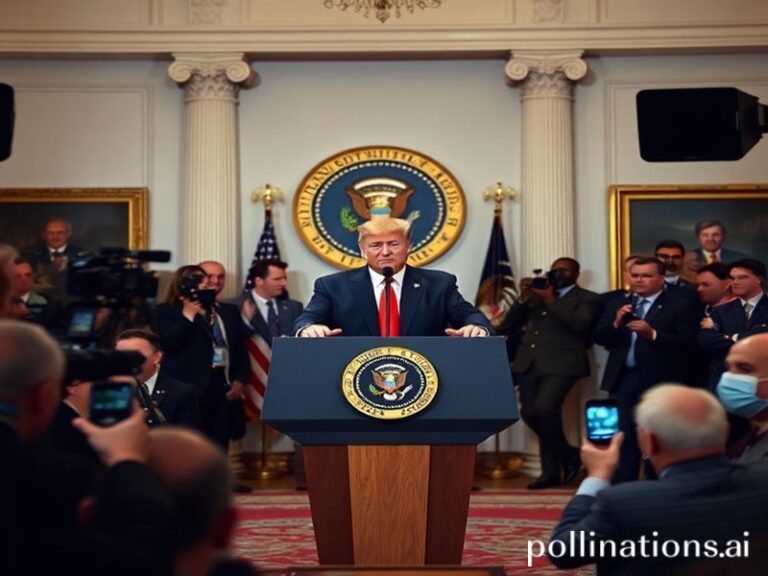Around the World in 80 Gigs: One Global Journey, Sponsored by Irony
A big bold beautiful journey used to mean a silk-lined suitcase, a steamer ticket, and the faint hope that your name wouldn’t be misspelled at Ellis Island. Today it means 4.9 billion smartphones chanting the same algorithmic rosary while their owners scroll through thirty-seven near-identical photos of someone’s brunch in Bali. The distance between romance and reality has shrunk to the width of a boarding pass barcode; the planet, once a terrifying blank space labeled “here be dragons,” is now a 24-hour duty-free lounge where the dragons have unionized and are demanding gluten-free passengers.
Start in São Paulo at dawn—though “dawn” is negotiable when the skyline is a permanent orange from the burning Amazon subcontracted to the highest quarterly bidder. A young logistics analyst named Marina boards the first of three connecting flights that will, over the next 42 hours, trace the spine of global trade like a particularly expensive acupuncture session: GRU-DOH-IST-LAX. Somewhere over the Persian Gulf she watches a rom-com about two influencers finding love in a sponsored desert; the irony is free, the Wi-Fi is $19.99 per 100 megabytes. By the time she lands in Los Angeles, her carbon footprint has its own LinkedIn profile and is fielding recruiter spam.
Meanwhile, in Lagos, entrepreneur Tunde launches a fintech app promising to “democratize remittances” with the solemnity of a man who just trademarked gravity. His seed round is oversubscribed by venture capitalists who think Nigeria is a country and a growth strategy. The capital will be wired through Delaware, parked in Ireland, sprinkled across Mauritius, and finally arrive—miraculously laundered, like a born-again currency—back in Lagos to buy billboards reminding the unbanked how liberating it is to pay 2.7% per transaction. Tunde calls it a journey to financial inclusion; the IMF calls it Tuesday.
Cut to the Arctic Circle, where a cruise ship the size of Reykjavík is carving a wake through sea ice that, until recently, had tenure. On deck, passengers in complimentary parkas toast “the last sunset of its kind” with vodka distilled from melted glacier water—bottled in Scotland, naturally. Below deck, Filipino crew members rehearse the mandatory safety drill for polar bear attacks, a scenario not covered in Manila’s maritime academy. The bears, for their part, are busy filing a class-action lawsuit against Homo sapiens for emotional distress and habitat appropriation; their legal team is crowdfunding on OnlyFlans.
Back on dry land—or what passes for it—Vanuatu has opened the world’s first diplomatic embassy in the metaverse. The ambassador, an NFT wearing flip-flops, issues visas in exchange for Ethereum and a promise not to look too closely at the server’s carbon offsets. Climate refugees, unimpressed by virtual consulates, continue to arrive by actual canoe. The Pacific Ocean, ever the polite host, keeps rising to meet them halfway.
In Brussels, EU regulators draft the Digital Services Act Annex 94-B, subsection π, requiring all “transformative journeys” to display a pop-up warning: “This experience may contain traces of colonialism, gentrification, and unregulated data extraction.” Multinationals respond by rebranding their apps as “empathy accelerators.” Stock prices soar; dictionaries file for bankruptcy.
And yet, amid the sponsored transcendence, pockets of unbranded humanity persist. In rural Rajasthan, a grandmother who has never heard of Frequent Flyer status walks 12 kilometers to charge her granddaughter’s secondhand tablet so the child can attend Zoom school under a banyan tree. The signal is patchy, the future buffering, but the girl has already drawn a picture of Mars labeled “Home.” When asked why Mars, she shrugs: “Less traffic.”
Which brings us, circuitously, to the moral—an old-fashioned indulgence, like writing in cursive. The big bold beautiful journey was never about the distance between airports; it’s about the increasingly creative ways we pretend that distance still matters. We stamp our passports, collect our e-visas, and congratulate ourselves on crossing borders while the borders, quietly and efficiently, cross us. Somewhere overhead, a satellite takes a selfie with the entire planet. The caption writes itself: “Wish you weren’t here.”







